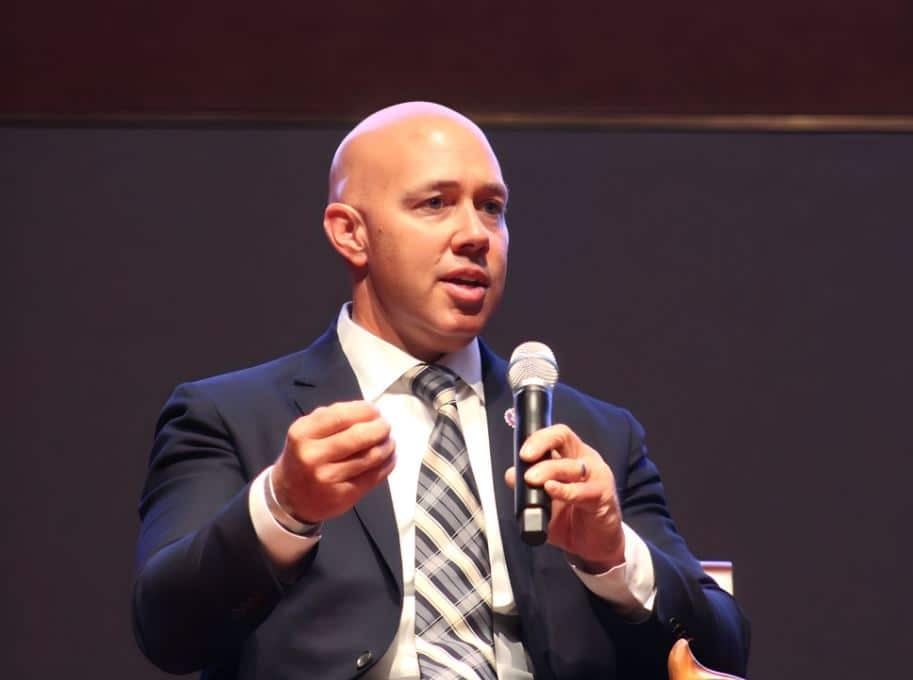House Members Say Legalizing Cannabis Could Be Winning Issue for GOP

WASHINGTON — A pair of conservative House members on Thursday said the GOP needs to wake up to the fact that the legalization of cannabis could be a winning issue for the party in 2024 and beyond.
The setting for the remarks by Reps. Brian Mast, R-Fla., and Nancy Mace, R-S.C., both members of the bipartisan Congressional Cannabis Caucus, was the first National Cannabis Policy Summit ever held inside the U.S. Capitol building.
The extraordinary session was held in conjunction with this year’s National Cannabis Festival, which is being held at the Fields at RFK Campus in Northeast Washington on Saturday.
The summit itself, which extended from mid-morning to mid-afternoon in an auditorium beneath the Capitol Visitor’s Center, featured a series of moderated discussions with lawmakers on both sides of the aisle who are dedicated to advancing new cannabis policies at the federal level.
In addition to Mast and Mace, speakers included Reps. Earl Blumenauer, D-Ore., David Joyce, R-Ohio, and Barbara Lee, D-Calif., as well as Sens. John Hickenlooper, D-Colo., Jeff Merkley, D-Ore., Jacky Rosen, D-Nev., and Senate Majority Leader Chuck Schumer, D-N.Y.
Kicking off the day was Mace, who acknowledged concerns that legislative reform around cannabis would not be a high priority for the new Republican-controlled Congress, but then argued there’s every reason for that not to be the case, including seemingly unrelated events, such as the recent implosion of Silicon Valley Bank.
“Here we have a bank — and other banks — that are under tremendous financial stress, and we haven’t had a vote yet on the SAFE Banking Act,” she said.
The SAFE Banking Act, officially the Secure and Fair Enforcement Banking Act, would enable cannabis businesses to become part of the legitimate economy by allowing them to access banking services, something they are currently denied.
Introduced in the House by former Rep. Ed Perlmutter, D-Colo., the bill garnered tremendous bipartisan support when it came up for a vote in September 2019, passing by a vote of 321-103, with 229 Democrats, 91 Republicans and one independent voting for it, while 102 Republicans and one Democrat voted no.
Despite the fact Merkley introduced a companion bill in the Senate, the chamber has never taken a vote on it. Last year, Schumer hoped to attach it to a “must pass” bill, like the 2023 National Defense Authorization Act, during the lame-duck session, but failed to advance it.
“The FDIC tells us that there’s about $10 billion in cannabis-related money that business owners would love to bank and pay into the FDIC insurance fund — problem solved, right? — and so it is concerning that we haven’t done that yet,” Mace said.
“There are a lot of things that we could be doing for small businesses, to help them out, particularly in this industry, and we’re not doing any of that,” she continued. “And I would argue that a lot of what we are doing right now has no chance of passing the Senate and will not help the American people.
“This is an easy win,” Mace said, pointing to a recent Winthrop University poll that showed 77% of South Carolinians support medical cannabis, and that another 56% support the legalization of adult use cannabis.
“And this, in a deep red state,” she said.
“This shouldn’t be controversial for Republicans,” Mace added. “This is a winning issue for us, if we do it in a responsible manner.
“Maybe it’s because we’re a little bit younger than some of our colleagues,” she said, nodding to Mast, who was sitting to her right. “But it’s confusing to me that we can’t at least make the tiniest bit of incremental change and help these businesses that are already doing business in states across the country.”
Last year, Mace herself introduced the States Reform Act, which would have ended the federal government’s 85-year prohibition of cannabis.
Specifically, Mace’s bill would have removed cannabis from the Controlled Substances Act, where it is joined by LSD and heroin, and would be regulated like alcohol.
The federal government would impose a nationwide 21-year age limit for cannabis consumption, with an exception for medical use.
The bill would also allow for states to make their own rules and laws around cannabis, including banning sales and use within state borders.
But for all its seeming common sense, the bill went nowhere. An aide to the lawmaker, however, told The Well News on Friday she does plan to reintroduce it in the current Congress.

In the meantime, Mace said she has been encouraging Republican colleagues to poll their districts and states on the issue and to review the data and research that’s already available.
“Since introducing my bill, I have spoken all over the country, at different cannabis-related events, and no matter where I go, whether in be Texas or California or Florida or New York, I inevitably run into someone from my home state — where cannabis is prohibited — who has a retail space and wants to grow and wants to sell and yet they can’t. And they’re usually Republicans!
“And so it’s just mind-boggling to me that the only place that cannabis is controversial is here in the Capitol. The rest of America is way ahead of where we are here in Washington. And, again, that’s why I encourage every member of Congress to poll their district on the issue. I think they’ll be shocked at how supportive people are of this issue. I know I was when I saw the numbers for South Carolina,” Mace said.
Mast has also been reaching out to his colleagues on the cannabis issue and said the key to consensus, like any other conversation one has in life, is to “know your audience.”
“There are 435 different people here, and they all have different potential biases,” Mast said. “So you ask yourself, ‘Is this a political bias?’ ‘Is their opinion on this issue based on what happened in an election and the electorate they represent, not just in their state, but in their specific district?’
“Or you might ask yourself, ‘Is it a data bias?’ ‘Is their point-of-view based on certain specific graphs or data or statistics and that’s what’s preventing them from embracing this issue?’ So, know your audience.
“For me, I’ve tried to come to it like I would with any policy issue and just be intellectually honest. In my own experience, doing that, I can say, ‘Okay, well, I believed in this policy when I applied it to this issue, so the same policy or philosophy should apply when I’m looking at this issue over here, or this one over here, as well.’
“Now, I’m a states’ rights guy. I’m libertarian in many of my views. And when I look at an issue like cannabis, I say, ‘Okay, if I believed these other issues were states’ rights issues, then cannabis is a states’ rights issue too.’
“And so much of my GOP audience talks about states’ rights constantly. So what you do is find the places that’s talked about states’ rights, and remind them of where they made intellectually solid states’ rights arguments and then say, ‘What is the difference here, in regard to cannabis?’ Because I don’t see [drawing a distinction] as being intellectually honest.”
Just last month, Mast and Blumenauer cosponsored the Veterans Equal Access Act, a bipartisan bill that would require the Department of Veterans Affairs to authorize health care providers to discuss medical marijuana with veterans and complete forms reflecting their best recommendations.
The legislation would undo current law, which prohibits physicians from discussing marijuana with their patients, and veterans who receive care from VA facilities cannot receive the forms required to participate in medical marijuana programs — regardless of whether the state they reside in has legalized it for medical use.
Mast said his own embrace of the importance of the issue stemmed from his experience as a combat-injured veteran.
Following in his father’s footsteps, Mast joined the U.S. Army, and he had served more than 12 years when he was deployed to Afghanistan as a bomb disposal expert under the elite Joint Special Operations Command.
In 2010, an improvised explosive device he discovered went off, resulting in catastrophic injuries, which included the loss of both of his legs.
“I woke up not far down the road from here, at the Walter Reed Army Medical Center, and at the time, there were probably 60 or 70 men and women in similar conditions to my own,” he said.
“And what I saw clear was both how debilitated some of these individuals were, and how they found peace through cannabis … that it was making a difference in their lives,” he added.
For Mast, who’d never undergone a major surgery or taken anything stronger than a Tylenol or Motrin for minor pain in his life, the benefits his friends in the hospital got from cannabis was a revelation.
“When I woke up, at Walter Reed, I was very much at peace with my life and what had happened to me on the battlefield, but thousands who come home are not at peace with what they experienced, or with what they did or with what had happened to them. And cannabis was the difference.
“With it, they could cope, they could sleep, they could get back to work … and they didn’t have to be so dependent on the prescriptions they’d been given,” he said.
Asked why he thinks a bill like his could pass now when cannabis legislation has historically not found favor on the Hill, Mast said the simple truth is that Congress simply isn’t as entrenched a place as it used to be.
“What’s changed, I guess, is that Congress isn’t as entrenched as it used to be,” he said. “What used to happen is people would simply look at their historical perspective and say, ‘Well, I said this 20 years ago, so I must have the same opinion today.’ Today, there are far more newer members in each Congress, so they’re not hemmed in by their own legacies and statements.
“And that’s helpful to me too, as an advocate, because I don’t have to try to disabuse someone of something they said 10 years ago and explain what’s changed since they first adopted their position,” Mast said.
“Likewise, having an early conversation with new members when they get here is important as well,” he said.
Dan can be reached at [email protected] and @DanMcCue

























